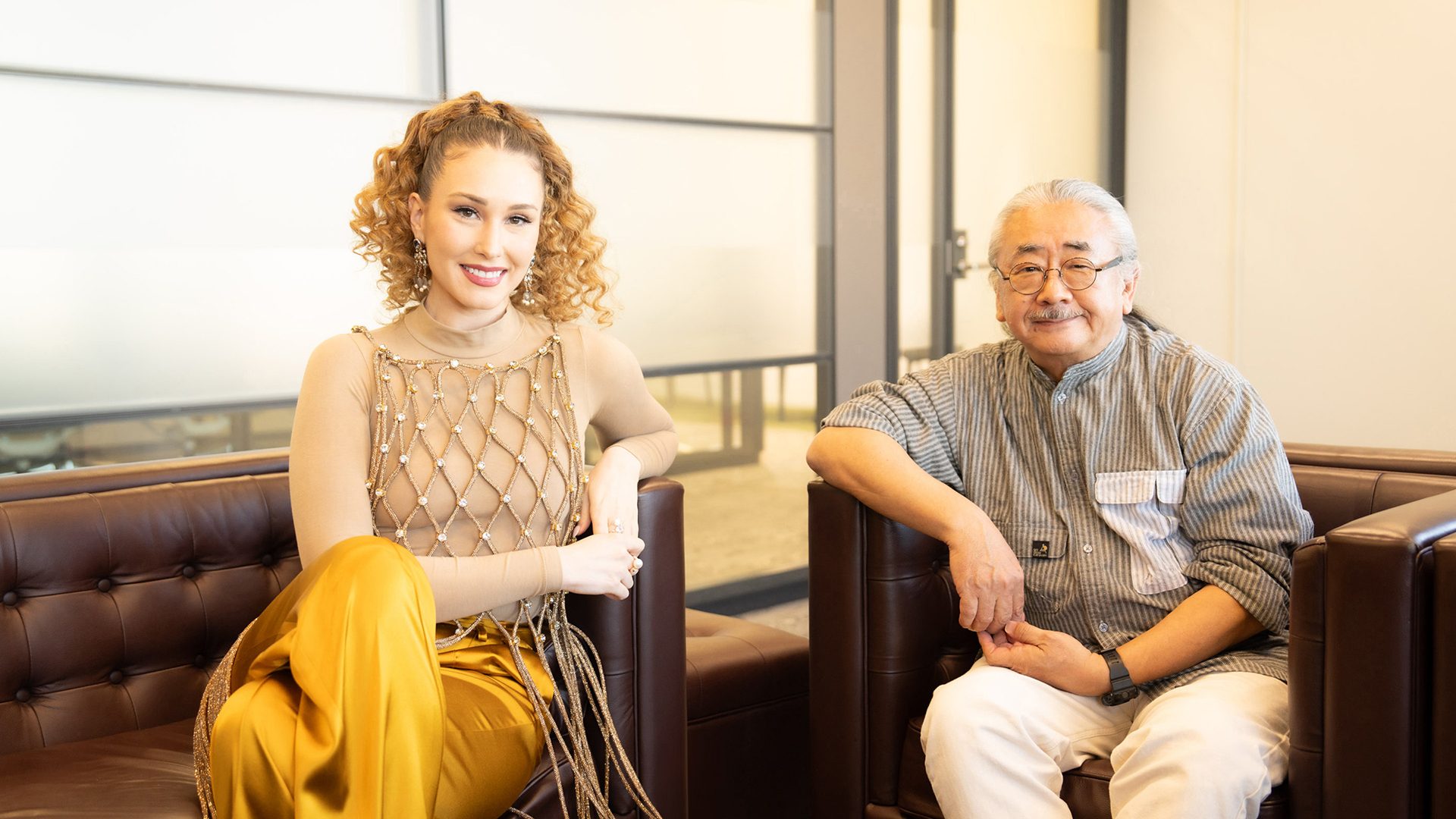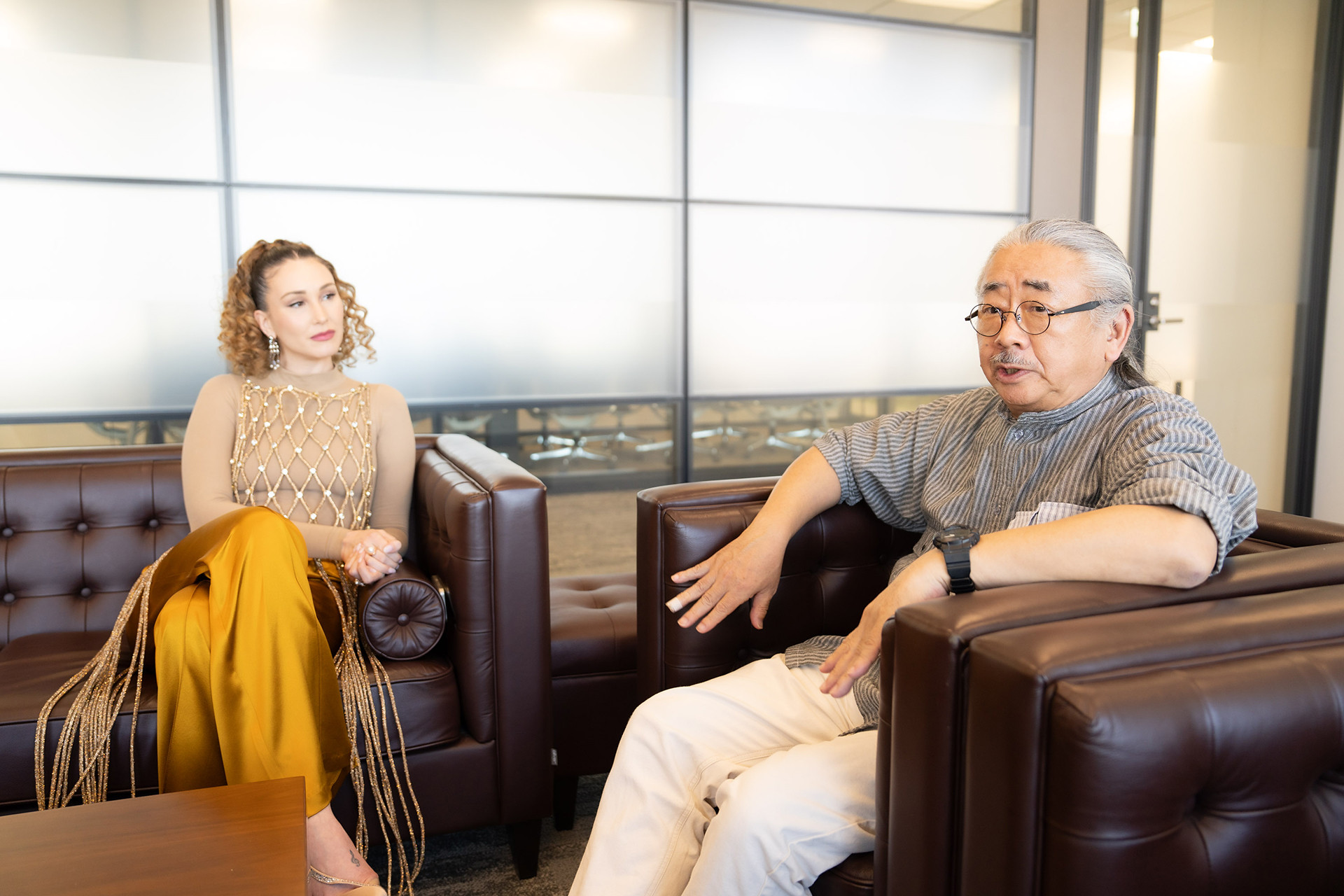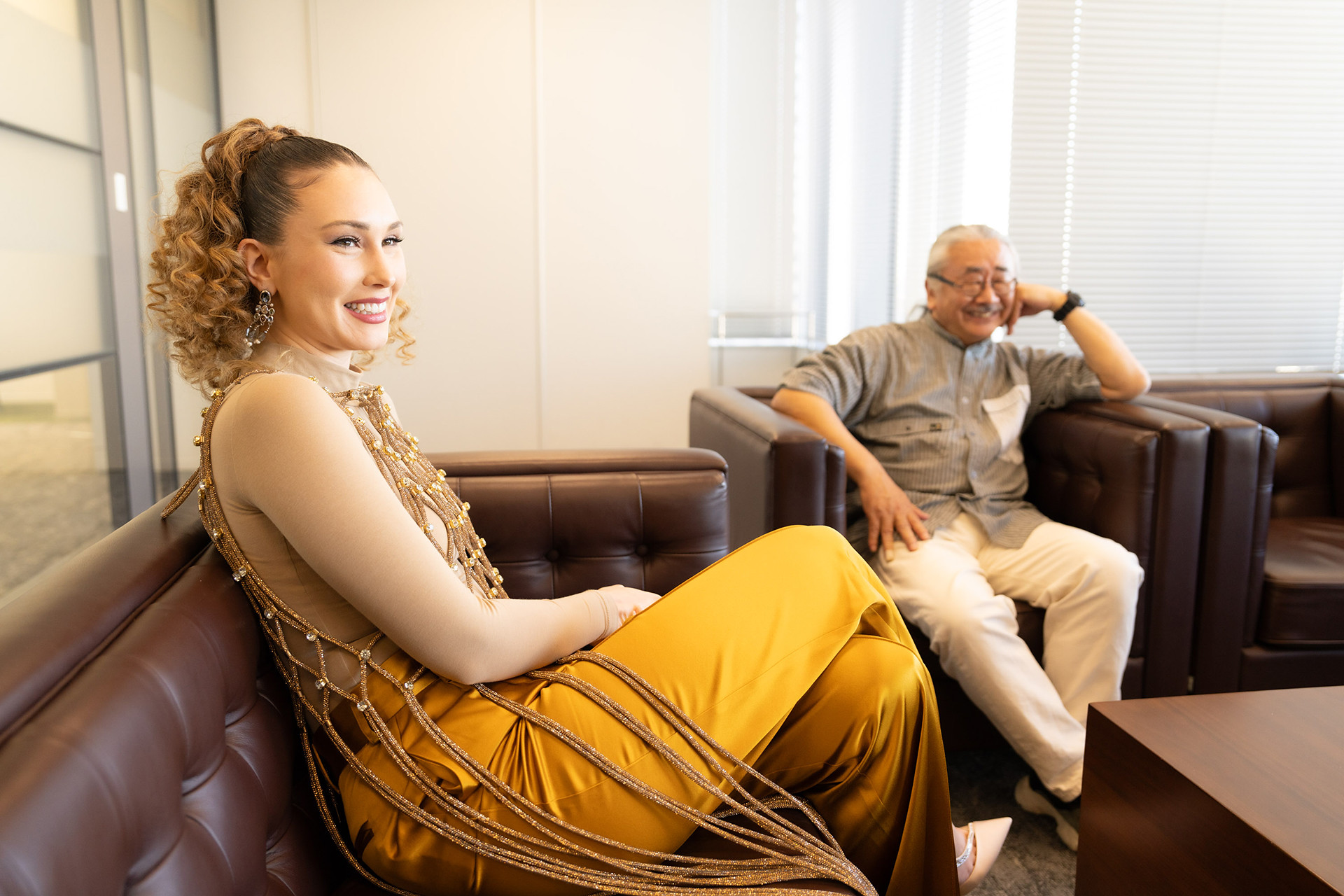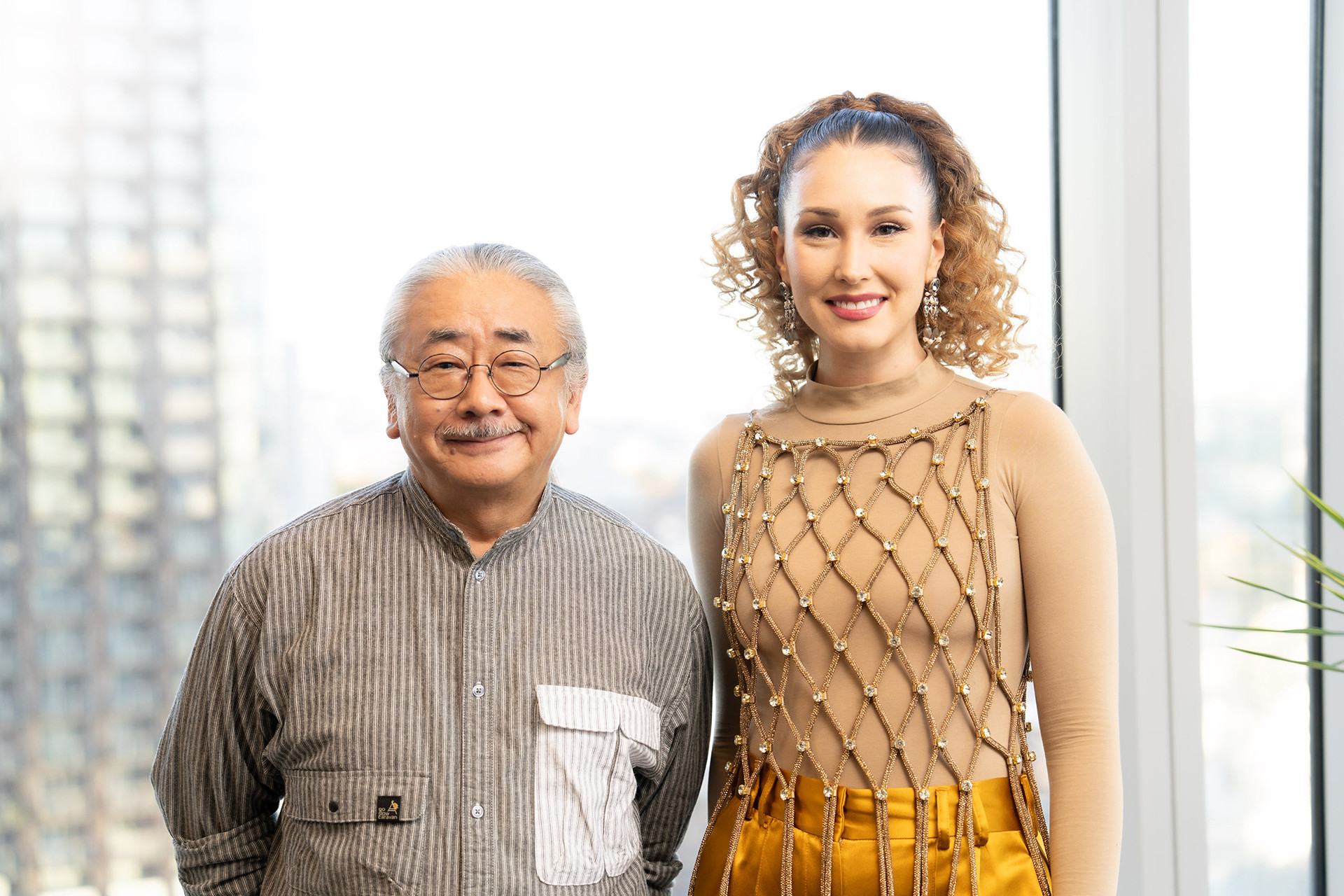We’ll say this up front for those of you still exploring Final Fantasy VII Rebirth’s vast world: there are no late-game story spoilers here. As seen in its pre-release debut via a new trailer late last year, the action RPG’s theme song “No Promises to Keep” is performed in-game by Aerith. Behind the scenes though, the track was composed by Nobuo Uematsu, the legendary composer behind the iconic soundtracks for much of the Final Fantasy series, including Final Fantasy VII Remake. The song’s vocals were performed by American singer Loren Allred, who brought her spellbinding singing voice to the track, augmenting the beautiful—yet tragic—world of Final Fantasy VII Rebirth and the epic story told within it.
The two musicians sat down for an exclusive interview to delve into the behind-the-scenes stories of the creation of this celebrated ballad, inspired by Aerith.
Nobuo Uematsu
Nobuo Uematsu is a Japanese composer whose prominent career started in 1986 when he joined Square, a Tokyo-based video game studio. During his 18 years of tenure as a composer for Square, he contributed to many game scores, including the Final Fantasy series, Final Fantasy Legend, and Chrono Trigger. In 2004, he left Square to establish his own production companies, SMILE PLEASE and Dog Ear Records, where he continued to work on various game music projects. In 2020, Uematsu composed a theme song for Final Fantasy VII Remake, which won the Japan Gold Disc Award for “Soundtrack Album of the Year.” Besides his renowned game scores, he has entered a new realm of global success by producing and directing orchestra world tours. More recently, he has held Nobuo Uematsu conTIKI SHOW, featuring various style performances by Nobuo Uematsu himself and his band, a live performance by his band, and a live reading of “The Story of Blik-O,” an original work for which he wrote both the story and the music.
Loren Allred
Loren Allred is a singer and songwriter who gained acclaim for her astounding vocal performance of the multi-platinum song “Never Enough” from the Oscar-nominated and Grammy award-winning “The Greatest Showman” soundtrack and film. Although she wasn’t a familiar face to the public, in April 2022, Loren appeared on Britain’s Got Talent, where she performed “Never Enough” and received a Golden Buzzer, sending shockwaves throughout the industry. Loren is widely regarded as one of the industry’s greatest voices and has collaborated with Michael Bublé and toured globally with recording legends Andrea Bocelli and David Foster.
Uematsu knew Allred’s singing voice was “it”
PlayStation Blog: As you composed the theme songs of both Remake and Rebirth, what are your feelings about having to work on Final Fantasy VII scores today?
Uematsu: The original Final Fantasy VII was released 27 years ago. I highly doubt that the music from my 30s will resonate with fans today. So, I feel very grateful to be invited back to work on the game scores. Very fortunate, indeed.
To compose “No Promises to Keep,” what kind of communication did you have with the creative director, Tetsuya Nomura, and the scenario writer, Kazushige Nojima?
Uematsu: I think the three of us unanimously had a predetermined vision to go with a ballad. Since I am typically inclined to write ballads, I was hoping for a ballad as it would allow me to create melodies as my heart desired. And it turned out everyone was on the same page. As we watched a provisional scene of Aerith singing, the three of us agreed a classic ballad would be a perfect fit.
Did Mr. Nomura make any specific requests for the song?
Uematsu: No, not really, since we all agreed on a ballad fairly smoothly. However, he did say that he wanted Loren Allred to sing the theme song.
What was your first impression after hearing Loren’s singing voice?
Uematsu: Although I didn’t know her name at that time, I immediately knew she was “it” when I heard her voice. Then I listened to “Never Enough” from “The Greatest Showman” and thought, “She is great. She’s the one we’re looking for!” But we couldn’t get ahead of ourselves because this was before we even contacted her and knew she’d be on board.
What was the inspiration behind No Promises to Keep?
Uematsu: Since it is a ballad, I wanted to make it absolutely electrifying. I was asked to make the song so that the key phrase would play in repetition, and that’s when Harry Nilsson’s “Without You” came to mind. I took inspiration from it and decided to repeat a key phrase in the chorus.
Loren: “Without You” is one of my favorite songs.
Uematsu: Mine, too. But it turned out that no one repeated the key phrases in the lyrics after all [laughs].
Does that mean you started composing the music without Mr. Nojima’s lyrics?
Uematsu: That’s correct. I first composed the melody and gave it to Mr. Nojima and the team. From there, they came up with the lyrics. When I was writing the song, I wanted to make the song memorable and catchy, the same key phrase being repeated again and again.
Loren: So, even though you (Mr. Uematsu) didn’t write the lyrics, you had already envisioned a structure where the chorus would be repeated to make the song more pop?
Uematsu: Yes. I thought repeating key phrases would make the song catchy.
Loren: Cool! That’s interesting!
Mutual trust: how they overcame challenges during recording
So, Loren, please tell us how you felt when Square Enix contacted you.
Loren: It was two years ago when I received an email from Square Enix. However, the message was very vague. I immediately started looking and learned that it was for a game title and that it was a song by Mr. Uematsu. I was already familiar with his work, and I was thrilled to learn that it was for the Final Fantasy franchise. As someone who knew about Aerith’s character growing up, this really meant a lot to me.
What was your prior impression of the Final Fantasy series?
Loren: Final Fantasy is a highly imaginative fantasy game series featuring very complex, engaging characters, and of course, I knew Mr. Uematsu was the composer. Both the story and music are essential aspects of the game.
Uematsu: I am happy you feel that way.
How did you feel when you first listened to “No Promises to Keep?”
Loren: The melody was very prominent. I could palpate sweet and epic moments of the story through the melody and feel the elevation of the song. I thought how amazing it would be to experience all these dynamic sensations in the game. Also, I knew this would be a paramount platform for Aerith to reflect her inner character through lyrics and express it to the fans, as it was her first time singing.
Uematsu: This is the first time I’ve heard this, and I’m glad she sensed exactly what we were aiming for. “No Promises to Keep” is a love song. I wanted it to exude a sweet feeling, but at the same time, evoke the complex feeling as Aerith confessed her feelings. I tried to build up the song as it climaxed, exactly as Loren described.
Loren: One of my initial thoughts was how challenging it would be to sing the song. As a vocalist, I find it easier to sing higher notes with an open mouth to produce the “aa” sound, but many lines of the song ended in the “ee” sound [laughs].
Uematsu: You’ll have to take that up with the English songwriter [laughs].
Was there anything you paid attention to when singing “No Promises to Keep”?
Loren: I wanted to get to know Aerith well, and I also wanted to depict her relationship with Cloud. So, for me to channel her fragile and pure personality, I needed to change certain elements of my natural vocals to match up with her character.
Loren: But I also enjoyed singing the band version* because it allowed me to be me, adding more riffs and fun things.
Uematsu: I agree with you. You seemed to have enjoyed singing the band version more. You nailed singing the orchestral version used in the game, but you were very lively when you were singing the band version. It was fascinating to watch you perform differently, and it made me happy to see two different versions of youself.
Loren: I have done similar work on “The Greatest Showman,” where I provided my singing voice for a character. So, in a way, both of these experiences are like acting. However, since I have my own style outside of movies and games, I’m humbled to hear that you also enjoyed my style of singing.
Were you, Mr. Uematsu, in the studio during the recording sessions?
Uematsu: The Tokyo team and the U.S. team were working remotely during the recording process. Loren was recording in the U.S., and I was in Tokyo, so we didn’t get to work together in person.
Do you have any memorable moments during the recording process?
Loren: I worked remotely with the Japan team. But we had some internet problems and got disconnected occasionally. The line got dropped just as an interpreter translated what had just been said, leaving me to imagine what was being said. When the connection was restored, the call dropped again as I got ready to speak. Because this happened frequently and became a time-consuming process, I asked if they would trust me to sing the song as I saw fit and submit the best recording version. They readily agreed. I was immensely touched by the trust they placed in me. I had a video crew from London with me that day, and it was after 2am when we finally finished shooting, but it was a great experience [laughs].
Uematsu: It wasn’t like we just told her to sing however she was pleased from the get-go; we had communicated precisely and in entirety about how we wanted the song to be sung, like, “I want you to sing this part like this.” We had already discussed and confirmed details when we decided we couldn’t continue with the unstable connection. At that point, we had already established the trust for her to sing independently, so it wasn’t like I offhandedly threw the whole thing over to her [laughs]. So, while I wasn’t there with her to actually watch her sing, I listened to the final version when it was ready.
What did you think when you listened to “No Promises to Keep” by Loren?
Uematsu: One word; amazing! I will never forget it. I received an overwhelming number of emails from different staff members at Square Enix, marveling at the song. Even Kazushige (Nojima) could not hide his excitement. I have written many songs for Final Fantasy, but the reaction we have seen for “No Promises to Keep” is unprecedented. There is something about her singing voice that is truly captivating.
Loren: I’m truly honored. Thank you.
Loren, was there anything different about singing a song for a video game?
Loren: It’s completely different. First of all, since Aerith is a fictitious character, it wasn’t like I could meet her to get to know her. I had to spend a lot of time online to learn about her instead. To top it off, since Final Fantasy has a cross-generational, long-standing fanbase, it’s not the same as singing for a new movie. I feel fortunate to have had the opportunity to sing for a game title, as I know how unique and fascinating the gaming world is.
Uematsu: You are absolutely right about being unable to talk to Aerith. As a composer, I have someone to consult with, like the director. Still, Loren, being so far away from Japan, probably found it difficult to ask questions to get more insights and immerse herself in the world of Final Fantasy VII Rebirth.
Loren: I did a lot of research on YouTube and Wikipedia and read so many articles.
Finally, do you have a message for the Final Fantasy VII Rebirth fans?
Loren: I am truly honored to have worked on such a well-loved game title and be the singing voice for a beloved character. I cannot wait for everyone around the world to play the game and listen to “No Promises to Keep.” I know many people were anticipating the release of Final Fantasy VII Rebirth, and I could not be more thrilled to imagine how the scene of Aerith singing the song would touch fans.
Uematsu: This marked another milestone in my book to have written one more song for the Final Fantasy series that I am genuinely proud of. Both the orchestral version and the band version are amazing, and I can’t wait for everyone to listen to the song. I hope “No Promises to Keep” will be loved for a very long time, just as much as the memories of Aerith.
“No Promises to Keep” will be available on Spotify, Apple Music and other streaming services from March 20. There is also a Final Fantasy Spotify playlist, featuring classic tracks from across the franchise, that you can listen to here.
*The single also includes “No Promises to Keep” band version.










